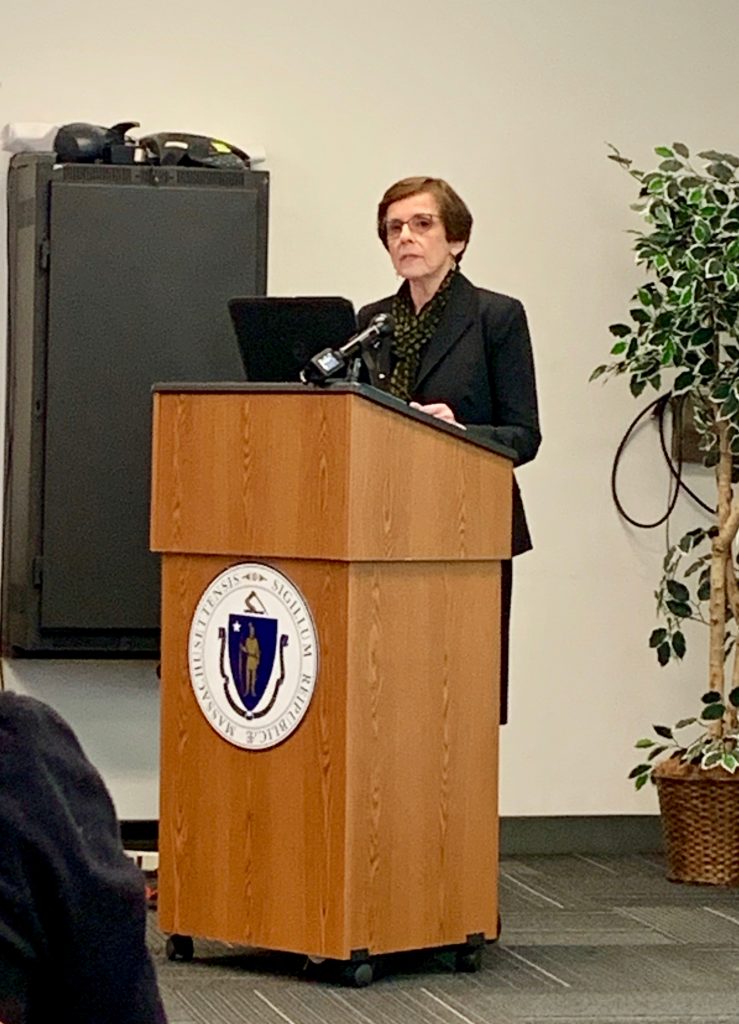On January 16, Cheryl Osimo, Massachusetts Breast Cancer Coalition’s Executive Director, delivered a statement during the Massachusetts Department of Environmental Protection’s Water Stakeholder Hearing. The following is the transcript of Ms. Osimo’s remarks:

“Thank you to the Massachusetts Department of Environmental Protection for hosting this hearing and opportunity to comment. I am here today on behalf of Massachusetts Breast Cancer Coalition supporters in support of the Conservation Law Foundation and Toxics Action Center. I want to thank these organizations for the thoughtful petition they have drafted to address this critical health issue.
Massachusetts Breast Cancer Coalition joins the call for enforceable standards for PFAS in public water supplies and believes that requirements must be put in place to test all public water supplies for PFASs so there is a comprehensive understanding of the contamination issues facing the Commonwealth. Without testing and monitoring of all public water supplies, Massachusetts residents may unknowingly be contaminated by their own water and the pace at which MassDEP is moving to protect the public health is disappointing. We know that some PFAS chemicals are carcinogenic, and therefore we all know that it is quite simply unacceptable for anyone to be exposed to these toxins.
PFASs have been linked to a wide range of health effects including immune system toxicity, elevated cholesterol, delayed mammary gland development, effects on the thyroid and liver, and cancer. Scientists are concerned that exposures to chemicals that alter mammary gland development may increase the risk of breast cancer. Pregnant women and young children deserve special consideration because early life exposures matter and the developing body is especially sensitive to PFAS exposures.
MassDEP’s current guidelines for public water supplies simply do not go far enough. And, equally concerning is the fact that the Department does not have standards for PFAS in soil hampering remediation efforts. Consider the situation in Barnstable County, as an example. According to testing of Massachusetts public water supplies required by the EPA between 2013 and 2015, Hyannis had the highest level of PFAS in the state. Massachusetts Breast Cancer Coalition recently sent a letter to Commissioner Suuberg to express our concern about the remediation of groundwater contamination at the Barnstable County Fire and Rescue Training Academy and the impact of this contamination on the public water supply for Hyannis. MBCC acknowledges that MassDEP is requiring certain steps to reduce the migration of PFASs away from the fire training academy towards the Hyannis public wells and further downstream. However, we are concerned that these steps don’t go far enough. The continued use of the site for firefighter training and the application of hundreds of thousands of gallons of water each year can flush additional PFASs into the sole source aquifer and towards public water supply wells for tens of thousands of Hyannis residents. MassDEP needs to establish standards for PFAS in drinking water and soil to ensure adequate remediation of contaminated sites, like the fire training academy in Hyannis. I use Hyannis as just one example of MassDEP’s lack of a comprehensive approach.
We do not have the luxury of time – we cannot allow another decade, another year, another month to go by without addressing these serious issues and the health risks to residents in Massachusetts. We know that MassDEP can and must do better. This expectation is the focal point of MBCC’s 2019 campaign. MBCC and our supporters will be paying close attention to the progress made by MassDEP in the coming weeks and months. The well-being of our children and future generations depends on your actions now!
I want to again extend my heartfelt gratitude to Conservation Law Foundation and Toxics Action Center for their comprehensive petition on behalf of Massachusetts residents.
Thank you.”
